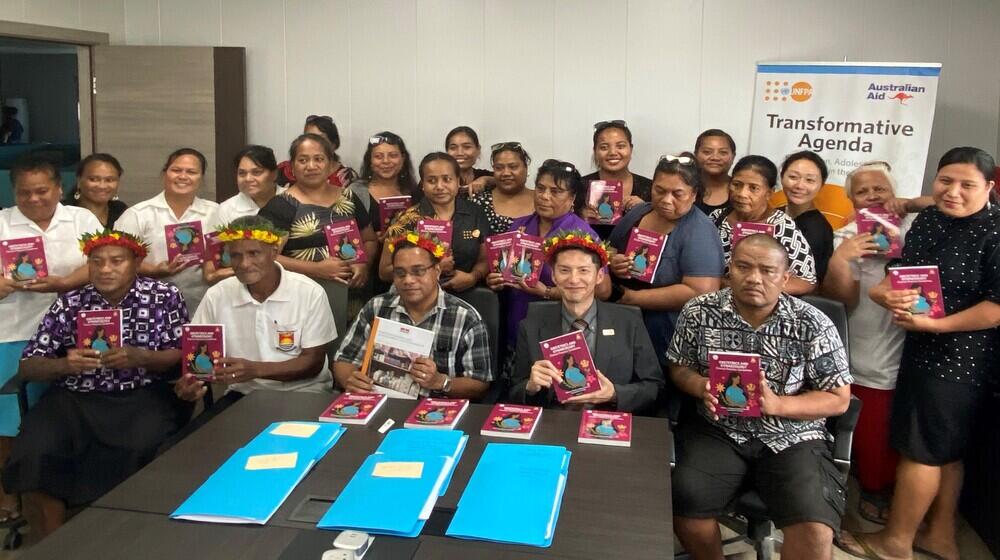TARAWA, Kiribati - Kiribati Ministry of Health and Medical Services (MHMS) has recently presented a series of reports, policies and guidelines that are essential for sexual and reproductive health (SRH), especially for women and youth, and for addressing gender-based violence. The launch of these essential policy documents, which were developed with assistance from the United Nations Population Fund (UNFPA) Pacific, was timely, as they will feed into the next Health Sector Strategic Plan (2024-2027) that MHMS is currently formulating.
Kiribati has made progress in many of the SRH-related indicators in the past decades; however, the Kiribati 20-Year Vision “KV20” 2016-36 points to the high population growth due to the “overall high total fertility rate” as a “significant development concern”. The country’s current population of some 124,000 is expected to increase by 45% by 2050 reaching close to 182,000, according to the estimate by UNFPA and SPC. A stagnating adolescent birth rate is among the related challenges, and therefore the current Kiribati Development Plan (KDP) 2020-2023 highlights the improvement of reproductive maternal, newborn, child and adolescent health (RMNCAH) as one of the priorities, including the promotion of “modern family planning methods,” as well as focuses on “protecting and supporting the rights of women (i.e., addressing gender-based violence), children, people with disabilities.”
Against this backdrop, UNFPA led by its Kiribati Country Office and Pacific Sub-Regional Office in Fiji assisted MHMS in developing a number of reports, policies and guidelines, during UNFPA’s last five-year multi-country programme 2018-2022 for 14 Pacific countries including Kiribati. Out of these, eight essential policy documents were launched by MHMS on 7 September 2023, including (1) Obstetrics and Gynecology: Clinical Practice Guidelines; (2) Health Facility Readiness and Service Availability Assessment report; (3) RMNCAH Policy; (4) Post-Graduate Diploma Midwifery Curriculum; (5) Health Management Information System (HMIS) Data Availability for Monitoring Sexual and Reproductive Health Programs Review and Gap Analysis; (6) Family Planning and Pharmaceuticals Logistics Management System; (7) Youth-Friendly Health Services National Operational Guidelines; and (8) Standard Operation Procedures for Response, Mitigation and Prevention of Sexual and Gender-Based Violence including Clinical Management of Rape.
“Starting from the RMNCAH Policy, these new policy guidelines and protocols serve as a crucial guidepost and offer practical guidance to health officials for their day-to-day planning, coordination, implementation, monitoring, and data management of life-saving maternal and newborn care, family planning, adolescent health, cervical cancer, sexually transmitted infections including HIV, as well as the health sector response to sexual and gender-based violence,” said Dechen Chime, Head of UNFPA Kiribati Office.
The official launching event of these documents was held in South Tarawa, joined by dozens of health officials and representatives of development partners including UN agencies and NGOs. “We are happily gathered here for the launch of a number of important policies and guidelines. These are the outcome of many months of hard work by the MHMS team, and I thank UNFPA and partners for their support,” said Dr. Revite Kirition, the Director General of MHMS, in his opening remarks on behalf of the ministry.
UNFPA Pacific Director and Representative to Fiji, Iori Kato, who joined the launch with MHMS during his first country visit to Kiribati, said, “UNFPA looks forward to continuing and further deepening its partnership with Kiribati Ministry of Health and Medical Services and all partners here, in the quality implementation of the RMNCAH and other policies for reproductive health and protection of women and adolescents and youth, in the years to come during the next Health Sector Strategic Plan, and beyond.” He also thanked the Australian Government’s Department of Foreign Affairs and Trade (DFAT) for its continued funding support to UNFPA Pacific’s Transformative Agenda Programme, as the programme enabled UNFPA’s assistance to MHMS with the formulation of these critical policy instruments.


